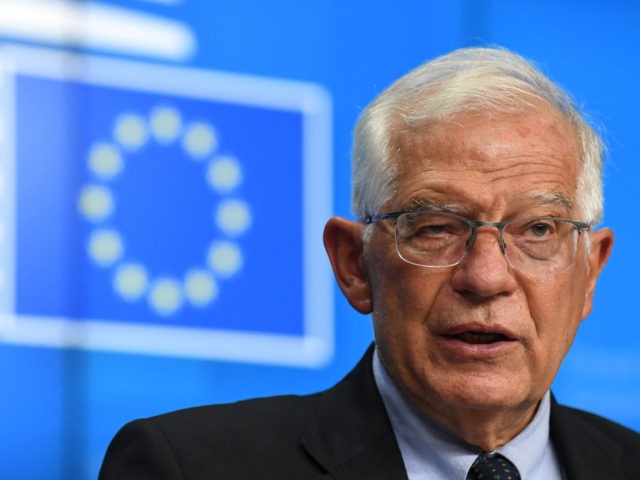The European Union is set to establish a diplomatic presence in Taliban-controlled Kabul amid increasing concerns over the influence of Communist China and Russia in Afghanistan, as well as a potential Afghan migrant crisis.
On Friday, the Foreign Affairs and Security Policy representative for the EU, Josep Borrell, said that the decision to forge a diplomatic presence in Afghanistan should not be understood as diplomatically recognising the Islamist Taliban as the government of the country, somehow.
Borrell claimed that engagement with the Taliban will be dependent on the Islamist group preventing Afghanistan once again becoming an exporter of terrorism abroad, respecting the rule of law, human rights, and a free press.
He also called on the Islamists to form an “inclusive” transitional government, to allow humanitarian aid workers to operate freely in the country, and to ensure the safety of foreign nationals attempting to flee the country.
“This requires engagement with the Taliban. We are going to see how we can do that in a coordinated manner, putting conditions and, according to the fulfilment of these conditions and according to the kind of government that the Taliban will form and how do they behave, we will be engaging successively with them,” Borrell said.
The Eurocrat said that the diplomatic presence will not come in the form of an embassy, for now, which he noted would amount to political recognition of the Taliban, but rather as a “humanitarian corridor” in order to help provide aid to the people of the country.
Borrell said that it should be seen as a “factual recognition”, explaining: “If you are in power and, certainly, they are in power, we have to recognise the reality.”
He went on to say that the European Union will have to adapt to the new political landscape in the region following President Joe Biden’s botched withdrawal from Afghanistan, saying that Brussels will need to determine how it “affects our relationship and our alliance with the United States” and how the EU will “manage the new regional landscape and the new role for Russia, China, Pakistan, Turkey and India.”
The move from the EU comes as Communist China has sought to become the first major ally of the Taliban regime. On Thursday, Taliban spokesman Suhail Shaheen announced that Beijing promised to maintain their embassy in Afghanistan following high-level talks with Communist officials.
The Taliban’s deputy leader in Doha, Qatar, Abdul Salam Hanafi, also revealed that they expect massive investments into Afghanistan under the guise of China’s Belt and Road Initiative (BRI), which the communist state has successfully used to trap developing nations into debtor status through Chinese-run infrastructure projects.
“China has been a trustworthy friend of Afghanistan. The Afghan Taliban is willing to continue to promote friendly relations between Afghanistan,” Hanafi said.
The Taliban’s second-in-command added that the BRI “is conducive to the development and prosperity of Afghanistan and the region. Afghanistan hopes to continue to actively support and participate in it.”
Russia has yet to announce that it will politically recognise the Taliban as the legitimate government of Afghanistan, however President Vladimir Putin said on Friday that Moscow hopes that the Islamist regime will “join the family of civilised nations,” adding that “Russia has no interest in the disintegration of Afghanistan.”
The United Kingdom, which officially broke with the European Union in January, has also signalled a willingness to cooperate with the Taliban in order to maintain stability in the region.
Foreign Secretary Dominic Raab said on Friday that while Britain has not recognised the Taliban as the legitimate government, the British government sees “the importance of being able to engage and have a direct line of communication,” adding: “No one wants to see the economic and social fabric of Afghanistan collapse.”
Aside from geopolitical concerns, the move by the EU to re-establish a diplomatic presence in the country comes amid increasing concerns of an Afghan repeat of the 2015 European Migrant Crisis.
Estimates have raised the possibility of up to 3 million migrants from Afghanistan fleeing to Europe, more than that of which came during the previous migrant crisis.
EU ministers have raised the idea of paying off neighbouring countries to Afghanistan to host those fleeing from the Islamist regime, rather than having them come to Europe’s borders. Countries on the eastern external borders of the EU, including Poland, Greece, and Lithuania, among others, have begun constructing border walls in order to stem the flow of migrants.
Follow Kurt Zindulka on Twitter here @KurtZindulka

COMMENTS
Please let us know if you're having issues with commenting.